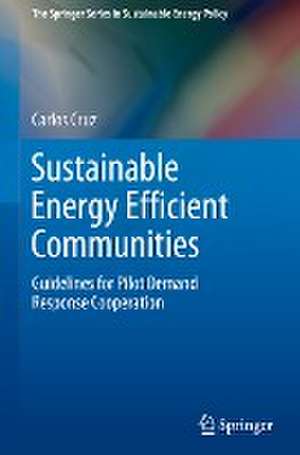Sustainable Energy Efficient Communities: Guidelines for Pilot Demand Response Cooperation: The Springer Series in Sustainable Energy Policy
Autor Carlos Cruz Cuvânt înainte de Ignacio Bravoen Limba Engleză Hardback – 9 feb 2024
Smart appliances (SAs) and other connected devices, together with smart communities (SCs)—which enable energy consumers to pursue common goals through cooperation and coordinated behaviour within the framework of the Internet of things (IoT)—have raised expectations regarding deployment of the information and communication technologies (ICTs) to encourage uptake of demand response (DR) energy efficiency programmes. DR programmes pursue a reduced carbon footprint, balanced supply and demand, and behavioural change in consumers.
The book provides sustainable evidence of ICT-supported energy management that can help consumers flexibly manage demand through the formation of sustainable SCs that maximise renewable energy use through large-scale cooperative management mechanisms. SCs cooperating securely in identifying consumption patterns can foster sustainable and efficient energy use, with the outcome of benefits for the participants and for the environment.
Preț: 780.06 lei
Preț vechi: 951.29 lei
-18% Nou
Puncte Express: 1170
Preț estimativ în valută:
149.28€ • 155.28$ • 123.24£
149.28€ • 155.28$ • 123.24£
Carte disponibilă
Livrare economică 24 martie-07 aprilie
Preluare comenzi: 021 569.72.76
Specificații
ISBN-13: 9783031499913
ISBN-10: 3031499913
Pagini: 116
Ilustrații: XVII, 116 p. 88 illus., 80 illus. in color.
Dimensiuni: 155 x 235 mm
Greutate: 0.39 kg
Ediția:1st ed. 2024
Editura: Springer International Publishing
Colecția Springer
Seria The Springer Series in Sustainable Energy Policy
Locul publicării:Cham, Switzerland
ISBN-10: 3031499913
Pagini: 116
Ilustrații: XVII, 116 p. 88 illus., 80 illus. in color.
Dimensiuni: 155 x 235 mm
Greutate: 0.39 kg
Ediția:1st ed. 2024
Editura: Springer International Publishing
Colecția Springer
Seria The Springer Series in Sustainable Energy Policy
Locul publicării:Cham, Switzerland
Cuprins
Energy demand management.- Aggregate demand planner.- Evaluation of the scheduling algorithm.- Behavioural analysis and pattern validation.- Experimental validation of the demand scheduler.
Notă biografică
Carlos Cruz holds a Ph.D. in electronics from the University of Alcalá, Spain, and since 2022, he has been a lecturer at the Electronics Department of this University. His areas of research are digital embedded systems, electronic design, and data analysis, and he has acquired extensive experience in detector evaluation, software simulation, and hardware design. Fellowships include CSIRC UGR (2007), JAE-TEC 2009, international research organisations and infrastructures (2011), and PTA 2018.
He is co-author of about 20 high-impact factor papers and has contributed to several national and international conferences.
He is co-author of about 20 high-impact factor papers and has contributed to several national and international conferences.
Textul de pe ultima copertă
This book analyses issues surrounding the efficient integration of demand response programmes in residential communities. It also explores the benefits and energy efficiency co-ordination corresponding to demand response service in a cooperative system. The author explains how sensors, communication technologies, computational ability, and control can be effectively combined to create a demand planification system.
Smart appliances (SAs) and other connected devices, together with smart communities (SCs)—which enable energy consumers to pursue common goals through cooperation and coordinated behaviour within the framework of the Internet of things (IoT)—have raised expectations regarding deployment of the information and communication technologies (ICTs) to encourage uptake of demand response (DR) energy efficiency programmes. DR programmes pursue a reduced carbon footprint, balanced supply and demand, and behavioural change in consumers.
The book provides sustainable evidence of ICT-supported energy management that can help consumers flexibly manage demand through the formation of sustainable SCs that maximise renewable energy use through large-scale cooperative management mechanisms. SCs cooperating securely in identifying consumption patterns can foster sustainable and efficient energy use, with the outcome of benefits for the participants and for the environment.
Smart appliances (SAs) and other connected devices, together with smart communities (SCs)—which enable energy consumers to pursue common goals through cooperation and coordinated behaviour within the framework of the Internet of things (IoT)—have raised expectations regarding deployment of the information and communication technologies (ICTs) to encourage uptake of demand response (DR) energy efficiency programmes. DR programmes pursue a reduced carbon footprint, balanced supply and demand, and behavioural change in consumers.
The book provides sustainable evidence of ICT-supported energy management that can help consumers flexibly manage demand through the formation of sustainable SCs that maximise renewable energy use through large-scale cooperative management mechanisms. SCs cooperating securely in identifying consumption patterns can foster sustainable and efficient energy use, with the outcome of benefits for the participants and for the environment.
Caracteristici
Provides the tools to create a demand planification system Useful for policymakers, energy professionals, and community leaders A guide for sustainable energy-efficient communities

